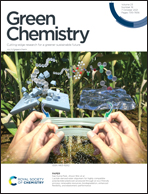One-step electrocatalytic synthesis of ammonia and acetone from nitrogen and isopropanol in an ionic liquid†
Abstract
Electrocatalysis is an environmentally friendly synthesis method that overcomes thermodynamic limitations and enables some reactions usually requiring high temperature and high pressure to be realized under ambient conditions. The one-step electrochemical synthesis of ammonia and acetone under ambient conditions was realized using an Fe-modified graphite rod or an Fe-modified stainless steel mesh as the working electrode, nano-Fe as the catalyst, N2 and isopropanol as the raw materials, and an ionic liquid (a trihexyl tetradecyl phosphine hexafluorophosphate; [P6,6,6,14][F6P]) as the electrolyte. The NH3 yield, faradaic efficiency, and acetone yield were 103.6 mg m−2 h−1, 20%, and 1060.4 mg m−2 h−1, respectively, for the Fe-modified graphite rod and 56.0 mg m−2 h−1, 60%, and 573.2 mg m−2 h−1, respectively, for the Fe-modified stainless steel mesh. This is a “green” and clean synthesis of ammonia that provides a new method to synthesize economic products from inexpensive nitrogen.



 Please wait while we load your content...
Please wait while we load your content...